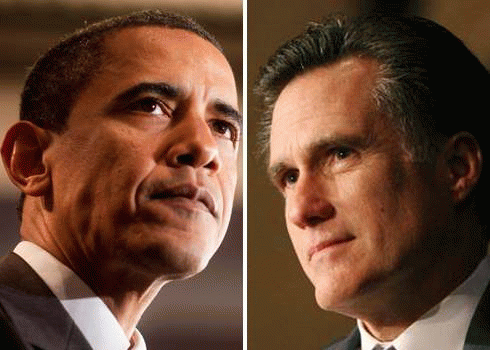obama-romney faceoff
After Joseph Smith found his holy "golden plates" (metal pages), in an 1823 cliff-side in upstate New York -- and wrote what became Mormon scripture, The Book of Mormon, he set up a community of true believers. But again and again, in the land of the free, from New York to Ohio to Missouri to Illinois, they were attacked, killed, and driven out. Finally, after Smith was killed by a mob in 1844, Brigham Young led the remnants west, into the hauntingly beautiful desert mesa country, beyond America, beyond civilization , where they ruled the state they created, Utah, for over a century. Even there, in 1857, the U.S. government sent an army against them over the banned practice of polygamy, which they finally abolished only in 1904.
In his trek towards the probable Republican presidential candidacy, Mitt Romney must feel echoes of his religion's past, as one pretender after another arose and was anointed front-runner for a few weeks or days, then dropped away, by the fundamentalist base of the Republican Party, desperate to stop the ascension of a Mormon, who are not considered Christian. Even among the general U.S. population, 38 percent don't think Mormons are Christians. However, 67 percent view them favourably, though 82 percent know little or nothing about them, according to the Public Religion Research Institute. The perhaps-insurmountable problem for Romney is 42 percent of Americans wouldn't feel comfortable with a Mormon as President as late as November 2011, and only 40 percent even realized he was Mormon (although similar attitudes once existed about blacks before the advent of Obama).
Repub candidates at April 12 AZ debate by Yahoo public images
First there was Rudy Giuliani, and then Donald Trump bloviating about the birther issue, although they weren't even declared candidates. Then came the execrable Michele Bachmann, a glaze-eyed evangelical zombie whose Fox News factoids were so outrageous that normally docile reporters had to repeatedly correct her, "I don't think Obama spent $200 million a day on his trip to India." Then giant-killer macho Texas Gov. Rick Perry, who had never lost a race, strode onto the scene with his Texas homilies and hard-line talk, but he embarrassed himself and the state by goofy ineptness in the debates: "Oops," he said, forgetting one of the three federal agencies he pledged to abolish. As Romney looked more inevitable, winning by a few votes (then losing by a few, but only two weeks later) in Iowa and winning easily in his near-home state of New Hampshire; the "anyone but Romney"-ites became more frantic. Black big businessman-banker Herman Cain was the flavor of several weeks, until a chain of women accused him of harassment, forcing him to quit the race. Likeable oddball anti-war, anti-government perennial candidate Ron Paul maintained a dedicated base of young and independent voters who ignored his extreme and unworkable plans, and he ran strong seconds and thirds in most northern states (almost won in Maine caucus).
Michael Hammerschlag (Hammernews.com) has covered 2 1/2 Presidential campaigns, managed a Democratic Presidential caucus in Seattle, helped save Bill Clinton with an anti-impeachment organization, and produced political ads and media advice. He broke the first big story about the media mistakes in the 2000 Pres. elections, and the worst irregularity in Florida. His articles have appeared in the New York Times, International Herald Tribune, Seattle Times, Providence Journal, Columbia Journalism Review, Honolulu Advertiser, Capital Times, Media Channel, Modern Photography, Scoop; and Moscow News, Tribune, Guardian, and Times; and Kyiv Post, Weekly, and Business Ukraine.






